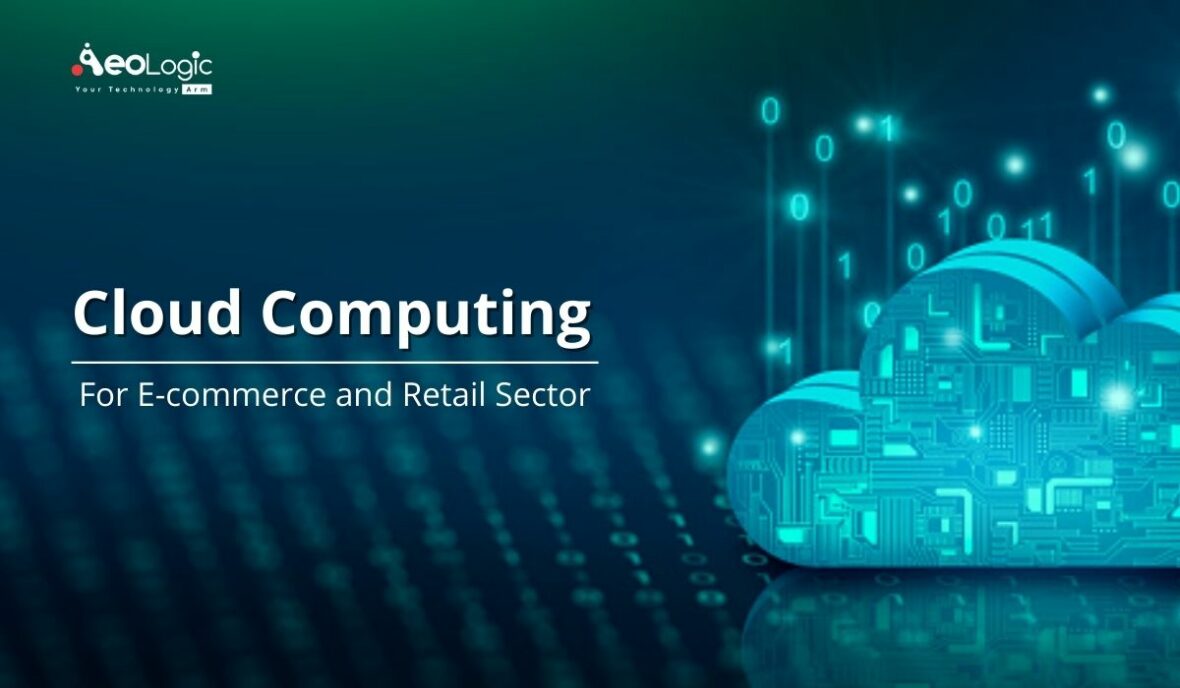After Covid-19, we are witnessing a reform in the e-Commerce and retail sector. The world is adopting new technology to enhance customer experiences. So, you can see the shift in customer purchasing patterns from in-store to online. It has provided a significant opportunity for retailers to enhance their online presence. In this transformation, cloud computing technology has helped the e-commerce and retail sector in a variety of ways. Let’s take a closer look at how can cloud computing be beneficial for the e-commerce and retail sectors.
To succeed in a highly competitive market, retailers must expand their consumer reach through many outlets. When cloud computing services are used in the retail industry, IT costs go down, efficiency goes up, and the user experience is improved.
Also Read: How Bright is the Future of Retail Technology in India?
What exactly is cloud computing?
Simply put, it is “on-demand access of computer system resources,” but it goes beyond that. The term “Cloud” refers to data centers that aren’t located in one place but can be reached through the Internet. These data centers offer storage, analytics, networking, software, and intelligence. It is a pay-as-you-go service that allows you to save and retrieve your data from anywhere at any time.
Cloud computing applications make it easier to manage data and save money at the same time.
You can use any cloud computing solution to improve capacity planning because specifications are more flexible. Furthermore, it promotes business continuity and security through modern technology and controls.
Benefits of Cloud Computing in the E-commerce and Retail Sector
Cloud computing benefits the e-commerce and retail industries in a variety of ways. It includes reduced infrastructure, storage, and processing costs and real-time access to operational and inventory data. Also, it includes improved inventory management, data security, a better user experience, increased profitability, and disaster recovery.
1. Scalability
Cloud hosting enables you to expand your e-commerce presence as your business expands. The cloud’s scalability nicely fits the demands of the retail sector. Also, building a larger IT infrastructure or provisioning additional servers on your own will delay your growth.
Our collaboration with the online retailer Construction Materials Online (CMO) is a prime example. They had three independent websites operating on various servers. And host their e-commerce sites in the cloud to accommodate their development.
2. Inventory Management That Works
One of the most prevalent issues encountered by the retail business is effective inventory management. Large retail organizations operate several outlets in different locations. They are unable to inspect or manage their inventory in real-time. Because of cloud computing, merchants may have a comprehensive picture of their inventory. The cloud provides real-time data, cloud architecture, and analytics platforms for developing predictive and prescriptive inventory forecasting. It dramatically reduces difficulties such as stock shortages.
Furthermore, while managing numerous locations, you do not need to manually synchronize each store’s inventory. You can access the data and stocks at any time and from any location to monitor real-time stock availability.
3. Stability
New marketing campaigns or product launches indicate more visitors. Cloud hosting’s strength provides improved stability for online shopping. You can also boost your traffic, shifting IT infrastructure to cutting-edge data centers.
We helped eCommerce sites in stabilizing their website. Hence, it could survive the extra traffic from a new television advertising that they wanted to air.
4. Speed
For an e-commerce firm, quickness is critical in keeping customers interested. 40% of customers leave a web page if it takes more than three seconds to load. Even Amazon saw a 1% gain in income after an improvement in website performance. Furthermore, a sudden increase in traffic might cause a website to slow down and become unavailable. Hence, Cloud computing gives you more bandwidth, computational capacity, and storage.
5. Cost Cutting
The ability to pay per usage allows you to consume services based on your needs. You don’t need to invest in hardware or software infrastructure. The expenses of establishing and maintaining IT infrastructure are reduced with cloud computing. Snapdeal built its own private cloud Cirrus in 2016. Also, the company says would save expenses and increase efficiency.
Also read: The Rise Of AI In The Transportation Industry
Wrapping Up
The global market for cloud technology is expected to reach $79.1 billion by 2018. Cloud services enable e-commerce businesses to achieve their objectives and give customers a personalized experience. Companies that have embraced cloud computing have a competitive edge over those that have not. Revenue has increased as a result of the agility and creativity it has delivered. Furthermore, a corporate “no-cloud” policy, according to Gartner, will be as unusual as a “no-internet” policy today. As a result, there is little question that the disruptive technology that has been disrupting the market throughout the previous decade will continue to do so.
FAQ’s
What can cloud computing do for a retail business?
What does cloud computing have to do with retail? The cloud can provide much more for retailers beyond lower processing and data storage costs. It can also assist with: margin management and pricing, personalization of websites and recommendation engines, management of loyalty programs, view of current inventory, and order fulfillment, across all channels, and inventory management.
How is cloud computing used in eCommerce?
Cloud computing makes it easier for an e-commerce program to change to market conditions. It lets the services be turned up or down depending on demand, traffic, and seasonal peaks. Hence, the cloud gives your company the scalable architecture it needs.







